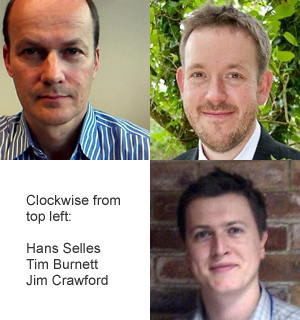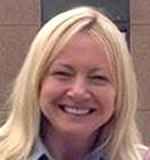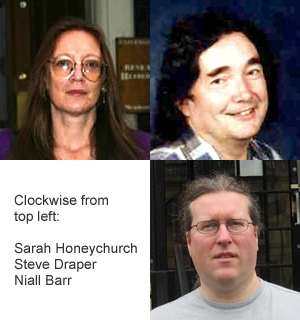Day Programme
With over 40 presentations from across the globe, this year’s Day and Online
Conferences are set to be the largest yet. Make sure you don’t miss the unique
experience that is eAssessment Scotland – the UK’s largest conference
dedicated to exploring the best examples of eAssessment in the world today.
Registration for eAssessment Scotland 2014 has now closed
Day Programme (5th September)
09:30
10:10
Prof. Karl Leydecker, VP (Learning and Teaching), University of Dundee
10:15
11:00
How to Unleash the Creative You – Better Summative Assessment through Superior Design ** FULL **
Hans Selles, Windesheim University (Netherlands) and Tim Burnett & Jim Crawford, BTL
If There Is a Will to Change, There Is a Way to Do It! ** FULL **
Steve Sidaway, MyKnowledgeMap and Dr Chris Wright, Sheffield Hallam University
Latest Technologies for Creating, Delivering and Reporting on e-Assessments
** FULL **
Ivan Forward, Questionmark
a. Adaptive Comparative Judgement
Gavin McCabe & Nora Mogey, University of Edinburgh
b. Capturing the Moment – Using Poodll for Sports Assessment
Jasmin Hodge, Forth Valley College
a. Virtual Patients
Paul Chapman, Glasgow School of Art
b. Interaction, Collaboration and Accessibility: Emerging Practices in Online Assessment
Navdeep Hundal, University of Sheffield
a. U101 Audio/Visual Feedback
Derek Jones, Open University
b. OneFile, supporting the delivery of SQA awarded SVQs
John Mathieson, OneFile
12:00
12:30
13:25
Graeme Clark, Scottish Qualifications Authority
13:30
14:15
Assessing Readiness for Team-based Learning ** FULL **
Shihab Khogali, Alisdair Smithies, Alison Gray & Natalie Lafferty, University of Dundee
a. Using Social Media (‘Tweeting’) to Assess Student Learning
Sarah Honeychurch, Steve Draper & Niall Barr, University of Glasgow
b. Open Badges in Open Education – Do They Count?
Martin Hawksey, Association for Learning Technology
a. Using Online Assessment with Undergraduates – Pros, Cons and Lessons Learnt
Dr Linda Morris, University of Dundee
b. My Portfolio Turned Out to Be More than Just an Assessment …
Libs Browne, University of York and Debbie Holmes, PebblePad
15:15
15:30
Peter Reed, University of Liverpool
16:00
Chaired by Peter Reed, University of Liverpool
Panel members: Mark Glynn, Dublin City University; Nora Mogey, University of Edinburgh; Bill Steele, University of the West of Scotland; and Peter Hartley, Edge Hill University
16:20
16:30
17:30
Session Descriptions
Keynote and Panel Sessions
 Viewing Summative
Assessment through Different Lenses
Viewing Summative
Assessment through Different Lenses
Peter Reed, University of Liverpool
Brookfield’s notion of lenses of reflection offers a useful framework with which to view all aspects of learning and teaching, including, importantly, the role and processes associated with assessment and feedback in education. Reflecting on assessment through the lenses of: self-reflection; students; peers; and the literature, enables a holistic view of practices and procedures. Such perspectives enable us to view the varying degrees of granularity, from a holistic bigger picture through to more specific and localised challenges, with potential then to redesign core, or introduce new, process to support and enhance assessment and feedback.
This presentation is guided by Brookfield’s metaphor to consider a range of aspects related to assessment and feedback, including challenges (e.g. of working in silos) and emerging trends (e.g. moving through assessment timelines and analysing student and staff performance in individual written assignments). It will also ask pertinent questions of the role of technology within the assessment-feedback cycle.
Bio
Peter Reed is a lecturer with a particular focus on Technology Enhanced Learning,
based within the Faculty of Health & Life Sciences at the University of
Liverpool.
Peter’s work focusses on a range of high level aspects where technology can support and enhance learning, teaching and assessment. His current research interests include the role of Assessment Analytics in learning more about staff and student performance; the use of social media; open education; and the the role of VLE minimum standards and Hygiene Factors in student satisfaction.
Peter’s blog – http://thereeddiaries.blogspot.co.uk/
@reedyreedles on
Twitter
Recordings of presentations delivered at the Day Conference
Back to top
 Using
the Data from eAssessment
Using
the Data from eAssessment
Mark Glynn, Dublin City University
As technology evolves and becomes more integrated into education, the data trail created by learners is enormous. The analysis of this data referred to as “Learning analytics” drives learning in a cyclical pattern; data is collected, analysed, and interventions are made based on the data. After these interventions, more data is collected and analysed, and additional (perhaps different) interventions are made.
This presentation outlines how the data related to assessments is collected from three different projects within DCU and then analysed with the aim of improving the student learning experience. Each project has two common threads; making life easier for the lecturer and improving the experience of the student.
Bio
Mark is Head of the Teaching Enhancement Unit and has a PhD in Chemistry, a MSc in
e-learning and certificates in Learning and Teaching in Higher Education and Online
Assessment. Mark has a deep insight into the key issues for higher education in
Ireland, in particular the implementation of national strategy for higher education,
the technological universities and flexible learning. He plays key leadership roles
in promoting innovative teaching and learning methods throughout the sector and is
considered to be a leading authority in the use of virtual learning environments.
Mark has also had leadership roles in the Irish Learning Technology Association and
the Learning Innovation Network, two of the leading organisations for learning
innovation in Irish higher education.
Mark has organised a range of national and international teaching and learning conferences for higher education. The main aim of his current role is to encourage and enable staff in DCU to increase their capacity to offer flexible learning. This involves managing both organisational and pedagogical based projects. More information is available through http://ie.linkedin.com/in/enhancingteaching or his blog #
Recording of presentation delivered at the Day Conference
Back to top
Workshops
 How
to Unleash the Creative You – Better Summative Assessment through Superior
Design ** FULL **
How
to Unleash the Creative You – Better Summative Assessment through Superior
Design ** FULL **
Hans Selles, Windesheim University (Netherlands) and Tim Burnett & Jim
Crawford, BTL
Renounce dull and passé assessment systems!
Uncork your unbridled creativity!
Create and deliver better summative eAssessment!
The days of grappling with ugly databases and scruffy home-spun eAssessment systems are finally over.
Join us, together with Hans Selles of Windesheim University, for a hands-on workshop to unleash your creative side with stylish content production, elegant management tools and summative eAssessment delivery that makes everyone go ‘wow!’
The workshop is in three parts:
- Learn about content production and how to craft innovative summative question types with embedded video, file attachments, pop-up tools and source materials.
- Construct an engaging test with a clean, quick and precise interface, and take advantage of the Automated Test Assembly capability.
- Try out the new features, including ‘share the test’ for peer review of work-in-progress.
Built with award winning design and accredited by the accessibility charity AbilityNet, Surpass Academic Edition is developed in co-operation with higher education experts from European universities.
Designed for academic users who want to create, manage and deliver high-quality exam content, Surpass gives Learning Technologists, IT Technicians and academics the scalability, security and creativity that today’s summative eAssessment demands.
Used by the UK’s leading Awarding Bodies and European Universities, workshop
attendees will gain insight into better assessment through superior design.
Back to top
 If
There Is a Will to Change, There Is a Way to Do It! ** FULL **
If
There Is a Will to Change, There Is a Way to Do It! ** FULL **
Steve Sidaway, MyKnowledgeMap (left) and Dr Chris Wright, Sheffield Hallam
University (right)
How to transform paper-based assessment for work placement learning, with 5 real life case studies, and an interactive workshop.
This is a busy session for those who want to make a real difference to the student experience, dispense with paper-based systems and improve student engagement. We will introduce three case examples from Sheffield Hallam University, and two from St George’s and Kingston University. The case examples show how MyProgress is changing the way students can be assessed in the workplace using a free app on their mobile devices. The app is perfect for observed assessment in challenging environments where there is no wifi, enabling the student to take control of their learning with work based assessors.
The case examples are drawn from teacher education, the whole of healthcare ranging from radiography through to medicine, both undergraduate and postgraduate. The workshop will include an exercise to download the free app and engage with the student experience. All you will need is smart device or a laptop and you can take away real-life assessments from all of the case examples above and a mini poster.
Back to top
 Latest
Technologies for Creating, Delivering and Reporting on e-Assessments ** FULL **
Latest
Technologies for Creating, Delivering and Reporting on e-Assessments ** FULL **
Ivan Forward, Questionmark
New technologies are helping academic institutions create content more efficiently,
deliver secure tests to a wider range of platforms and make meaningful use of test
results.
This session will cover the latest updates in:
- collaborative authoring
- responsive design delivery
- reporting and analytics tools
This is a great opportunity for you to connect with us, find out what’s happening and ask questions.
Back to top
 Assessing
Readiness for Team-based Learning ** FULL **
Assessing
Readiness for Team-based Learning ** FULL **
Shihab Khogali, Alisdair Smithies, Alison Gray & Natalie Lafferty,
University of Dundee
Team-Based Learning (TBL) is increasingly used within the University of Dundee. TBL provides opportunities for application of knowledge and problem solving (Michaelsen et al, 2007). The TBL strategy incorporates structured individual and teamwork activities and multiple small groups in a single classroom setting. Key features of TBL include individual and team accountability. Students are required to prepare individually before attending an in-class session, during which they first take an individual readiness assurance test (iRAT) followed by team readiness assurance test (tRAT).
A challenge for facilitators is capturing and processing iRAT and tRAT results in a timely manner to enable identification of concepts which require further explanation, before student teams engage in problem-solving activities during a TBL in-class session.
This workshop will provide participant with a hands-on experience of the TBL approach and the application of technology to support instant capture and processing of iRAT results.
Reference
Michaelson, L, Parmelee, D, McMahon, K, Levine, R. 2007. Team-based learning in
health professions education. Sterling, VA: Styllus Publishing.
Back to top
 Old
Tricks for New Times
Old
Tricks for New Times
Craig Brown, University of Glasgow
Voting systems (or ‘clickers’) have been with us for a while now, and we’ve seen considerable development in terms of what’s available – everything from dedicated handsets with multiple input options to apps that can be downloaded onto student smartphones. However, mainstream adoption of the technology has not kept up with early enthusiasm for the devices.
Why? It all seemed so promising …
It’s time to look again at how we use clickers. What have we learned and what are we getting right? Sign for a workshop that will lead you through 3 simple techniques for using voting systems:
- Real-time lecture interaction (quizzing on subject material)
- Course evaluation
- Groupwork
These are techniques that will work on ANY voting system, which you can take away and apply to your own contexts with the minimum of fuss.
A workshop that gets back to basics – no spin, no hype, just practical solutions.
Seminars
 Adaptive
Comparative Judgement
Adaptive
Comparative Judgement
Gavin McCabe & Nora Mogey, University of Edinburgh
The challenge posed was to assess more students while maintaining quality and not increasing resource input. We’ve done that. We’ve also got better reliability data than any other course we know!
The Edinburgh Award is a programme that wraps around, and recognises the effort that goes into, those activities that students are involved in outside the formal curriculum, e.g. volunteering, part-time work, and getting involved in the University community. As well as giving recognition for involvement, it actively promotes personal development and reflection.
In AY 2013/2014, more than 600 students successfully gained an Award from one of the 33 different activity areas – and the programme continues to expand. One big challenge for us was to find a way to scale the Award structure, while maintaining quality and controlling the resource, particularly the resource required for assessment and feedback.
A peer assessment methodology, adaptive comparative judgement (ACJ), appears to offer
the solution. This presentation will describe how we have successfully piloted an
online ACJ tool for The Edinburgh Award and share some of the feedback from that
experience. The success of the ACJ pilot is such that a number of academic
departments have now come forward keen to trial ACJ within the curriculum and this
will happen in the coming session.
Back to top
 Capturing
the Moment – Using Poodll for Sports Assessment
Capturing
the Moment – Using Poodll for Sports Assessment
Jasmin Hodge, Forth Valley College
After seeing Poodll, a collection of Moodle audio/video plugins, demonstrated at a MoodleMoot, the Sports Department at Forth Valley College decided to see if the tools would allow them to extend the range of assessment and feedback options within courses. Initial results have been promising, with audio blogging, audio/video-based assignments and mobile solutions for the gym sparking a lot of interest.
The flexibility of offering alternative submission formats allows lecturing staff to consider capturing ‘moments’ of evidence in authentic contexts, something which would have been challenging using traditional methods.
The presentation covers the College’s experience with Poodll, looking at what opportunities the Poodll tools offer and the practical issues involved with rolling out a new approach to assessment. There will be a short demonstration of what can be done with Poodll, and how it has been embedded into College courses.
Back to top
 Virtual
Patients
Virtual
Patients
Paul Chapman, Glasgow School of Art
Digital Design Studio (DDS) in collaboration with NHS Education for Scotland have developed a number of virtual patient training scenarios for pharmacy and dentistry covering issues related to drug protection, child protection, healthy eating, alcohol abuse, smoking cessation and patients’ rights.
By enabling the user to take the role of the pharmacist or dentist, we are able to recreate scenarios and conversations that would otherwise be difficult to replicate. Users can ‘experiment’ with different responses and also see the repercussions of their decisions. For example, a child with suspicious bruising comes into the dentist for emergency treatment. How do you raise your concerns with the mother? Initial trials of these learning scenarios have been extremely positive.
Back to top
 Interaction,
Collaboration and Accessibility: Emerging Practices in Online
Assessment
Interaction,
Collaboration and Accessibility: Emerging Practices in Online
Assessment
Navdeep Hundal, University of Sheffield
The Faculty of Medicine, Dentistry & Health delivers a number of Postgraduate Distance Learning Courses. There have been various challenges in delivering online assessments that are common to distance learning delivery, these include:
- Providing an engaging online environment for group work and collaborative working.
- Using technology that is easy to use and accessible for students based across different locations around the globe.
- Providing an e-submission mechanism for students to submit assignments online.
- Providing a mechanism to deliver student feedback and marks online.
This presentation highlights some of the emerging e-assessment practices being adopted within the faculty to address some of these challenges, including the use of PebblePad for e-portfolio assessment, online submission and marking through Turnitin and Grademark and the use of Google apps for collaborative assessment and groupwork.
Positive feedback received from staff and students demonstrates the impact of these tools in relation to enhancing the delivery of e-assessments including collaboration amongst students and streamlining the e-submission and feedback process. Conversely, we also highlight some of the barriers that academic staff face in using some of these tools, paying close attention to mechanisms and techniques to accommodate double blind marking.
Looking into the future, the emerging practices and trends that are developing within the health education sector in-line with the increase of mobile technology adoption are considered. Innovations in mobile application development and the ubiquity of the internet open up a range of possibilities, with this in mind we give consideration to possible future changes in e-assessment for conducting OSCE examinations using mobile devices to overcome some of issues surrounding traditional methods such as reliability of marking, storing scores and providing feedback. In addition to emerging trends, we look at the approach taken at both at a faculty and institutional level to support future practice.
Back to top
 U101 Audio/Visual Feedback
U101 Audio/Visual Feedback
Derek Jones, Open University
This presentation will share the results from extended trials of audio-visual feedback in The Open University (UK) course U101 Design Thinking.
Previous research has demonstrated the potential and affective characteristics of audio feedback and this study moves this research on in two main ways. Firstly, it compares two modes of feedback directly (written and audio summative tuition feedback) and the early results of these comparisons will be presented. Secondly, the particular benefits in distance education for formative assessment and tuition feedback will be presented with some initial ideas of the mechanisms behind the positive effects observed.
Finally, the particular case for this course, where a blend of visual activity is also used, will be discussed as an additional affordance in distance education and assessment.
Back to top
 OneFile,
supporting the delivery of SQA awarded SVQs
OneFile,
supporting the delivery of SQA awarded SVQs
John Mathieson, OneFile
“SQA’s endorsement of OneFile demonstrates that it is a robust and high quality
resource that will be of great use to both candidates and delivering centres.”
Hamish Brad, Customised Awards and Endorsement Manager, SQA
Eportfolio consultant John Mathieson will be demonstrating how the OneFile Nomad app lets assessors plan, assess and review offline and gives learners access to their portfolios to complete assessments offline.
Back to top
 Using
Social Media (‘Tweeting’) to Assess Student Learning
Using
Social Media (‘Tweeting’) to Assess Student Learning
Sarah Honeychurch, Steve Draper & Niall Barr, University of Glasgow
Social media is often viewed as an unwelcome distraction during lectures and tutorials – it’s something students use when they have switched off from the pearls of wisdom being delivered at the front of the class. However, it can also be harnessed as a tool to enhance classroom learning and even as a method of assessment.
Over the last academic year, we’ve been experimenting with various social media tools and using them in lectures and workshops to prove to ourselves that we can do this. During this presentation we’ll discuss some of our successful models and suggest how these can be adapted to suit different student cohort.
The session will also feature an interactive demonstration using a free, open source, bespoke “tweeting” tool that we are developing.
Back to top
 Open
Badges in Open Education – Do They Count?
Open
Badges in Open Education – Do They Count?
Martin Hawksey, Association for Learning Technology
In recent years there has been increased interest in open education practices and in particular the delivery of online learning. This ranges from institutionally-based courses such as the University of Coventry’s undergraduate photography class, PHONAR, extending to the emergence of online learning service providers such as Coursera.
The Association for Learning Technology (ALT), a membership organisation supporting the field of learning technology, has also explored this area with its Open Course in Technology Enhanced Learning (ocTEL). The latest iteration of ocTEL implemented Mozilla Open Badges as a way to accredit learning. Badges were awarded on a weekly basis for a range of tasks from simply ‘checking-in’ to completing predefined learning activities.
Given the range of criteria, this presentation explores the general question, ‘Do open badges count?’. As part of this, we explore the motivations behind badges and secondary effects created by open badges including ‘situational awareness’ and supporting Personal Knowledge Graphs (Siemens, 2014).
Back to top
 Using
Online Assessment with Undergraduates – Pros, Cons and Lessons
Learnt
Using
Online Assessment with Undergraduates – Pros, Cons and Lessons
Learnt
Dr Linda Morris, University of Dundee
In Life Sciences we were early adopters of online assessments using Questionmark Perception (QMP), which we rolled out for all end of module summative assessments in our first year modules in 2003. We also used it extensively in formative and low-stake summative assessments across other years.
The introduction of Exam Online (EOL) to the portfolio of technologies available here at Dundee, has enabled us to transform our assessment of higher years so that now all Level 2 and most Level 3 end of module assessments are carried out using either QMP, EOL or a combination of both and next academic year, this will be extended to final year assessments.
This presentation will look at the benefits and pitfalls and student response to online assessment.
Back to top
 My
Portfolio Turned Out to Be More than Just an Assessment …
My
Portfolio Turned Out to Be More than Just an Assessment …
Libs Browne, University of York and Debbie Holmes, PebblePad
Following a successful pilot all undergraduate nurses at the University of York are now using PebblePad to record the assessment of their clinical practice. This tripartite approach enables student, academics and placement mentors to interact with live, secure documents that are accessible anytime. The students are able to share reflections on practice learning and by interacting with the electronic workbooks are able to build comprehensive individual portfolios which can be used for multiple purposes:
- Assessment
- Fulfil registration requirements
- Enhance employability opportunities
- A platform for developing Continual Professional Development
- To support revalidation as a qualified nurse
We will discuss the implications of e-assessment of practice placements for students,
academics and mentors. Our student representative will give a student perspective of
the assessment and the bigger picture of the eportfolio to her as an
individual.
Back to top
 The
Bedford College Moodle GradeTracker and Other Stories
The
Bedford College Moodle GradeTracker and Other Stories
Roy Currie, Bedford College
This presentation will lead you through demonstrations of the latest versions of the Bedford College Moodle GradeTracker, ePLP and Reporting Dashboard extensions to Moodle, describe the process through which they were designed and created and show the impact that they have had on the College – including their roles in the recent Ofsted inspection. Over the past three years, Bedford College has been working to extend Moodle to become a comprehensive and fully-featured tool for the management of teaching, learning and assessment. This has resulted in the development of a range of new Moodle modules including: a student qualification progress tracking system (GradeTracker), our own modular Moodle electronic Personal Learning Plan (ePLP) and Reporting Dashboard. These tools have been developed by the college’s in-house Learning Technologies Team over the past three years and are now embedded across all areas of the college.
GradeTracker
The GradeTracker – which has been made available for free to any college that wishes
to use it – solves the problem of tracking unit/criterion-based qualifications
in Moodle. It has tools for calculating minimum targets from prior qualifications,
setting aspirational targets for ‘stretch & challenge’ and
predicting grades from progress against achievement of qualifications. The system
supports easy setup and customisation of qualifications and creation of
individualised programmes of study for learners. Support is in place for all BTEC,
City & Guilds and A/AS Level qualifications and many other families can be
accommodated through the ‘bespoke qualification creator’.
Learner feedback can be provided at qualification, unit and criterion levels. The GradeTracker includes tools for mapping online assessments, quizzes and other gradable activities in Moodle to specific units and criteria in tracking grids, so that tracking grids are automatically updated when work is submitted or completed. Teachers can mark online or export marking spreadsheets so that they can mark assignments and add comments at criterion level offline and then import the spreadsheets for bulk updating of tracking grids. A wide range of reports can be generated to show how groups and individual learners are performing against their targets.
ePLP
The Bedford College ePLP provides a modular single port of call for all of the
information required by the learner and the teaching team to manage and monitor the
learner experience. Modules currently available include attendance and punctuality,
tutorials, SMART target setting and monitoring, initial assessments, comments,
additional support records, timetables, termly report generation, prior learning,
intended destinations and assessment planner. New modules for the PLP are regularly
developed and added. The ePLP also features a Guardian/Employer Portal so that
parents or employers can be given permission to view selected elements of the ePLP.
Reporting Dashboard
The Reporting Dashboards allow the generation of reports on any combination of a
growing range of indicators such as learners ahead of or behind target grade levels,
initial assessment scores, GCSE English and Maths qualifications, tutorials received
and SMART targets set and achieved. These can be filtered according to level, age
group or programme area. In all reports you can drill down to individual learner
level. Reports can also be saved or exported to PDF or excel formats.
The development of these tools has generated considerable interest across the sector and as a result, the college has received funding to assist in making the GradeTracker module available for use for free by other colleges. Over 50 colleges have downloaded the latest version of the module and the college’s Learning Technologies Team is supporting a significant number of colleges in preparing for large-scale roll-outs of the GradeTracker for the coming academic year. In response to demand from the sector, the Team is also actively seeking support to release the ePLP, Reporting Dashboards and the latest Guardian/Employer Portal module to the wider FE community.

